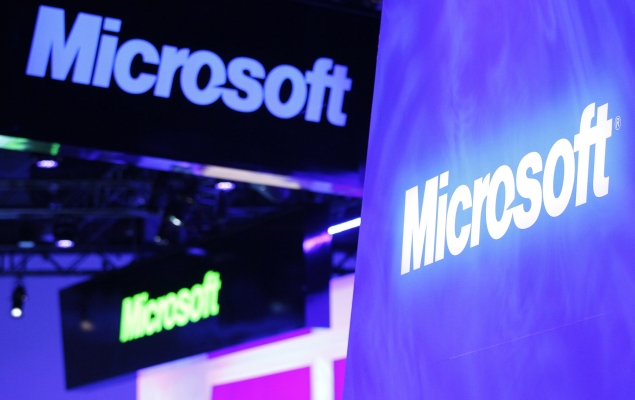- Home
- Internet
- Internet News
- Microsoft rewards $100,000 to hacker for Internet Explorer bug, issues update
Microsoft rewards $100,000 to hacker for Internet Explorer bug, issues update

The software maker also released a much anticipated update to Internet Explorer, which it said fixes a bug that made users of the world's most popular browser vulnerable to remote attack.
James Forshaw, who heads vulnerability research at London-based security consulting firm Context Information Security, won Microsoft's first $100,000 bounty for identifying a new "exploitation technique" in Windows, which will allow it to develop defenses against an entire class of attacks, the software maker said on Tuesday.
Forshaw earned another $9,400 for identifying security bugs in a preview release of Microsoft's Internet Explorer 11 browser, Katie Moussouris, senior security strategist with Microsoft Security Response Center, said in a blog.
Microsoft unveiled the reward programs four months ago to bolster efforts to prevent sophisticated attackers from subverting new security technologies in its software, which runs on the vast majority of the world's personal computers.
Forshaw has been credited with identifying several dozen software security bugs. He was awarded a large bounty from Hewlett-Packard Co for identifying a way to "pwn," or take ownership of, Oracle Corp's Java software in a high-profile contest known as Pwn2Own (pronounced "pown to own").
Microsoft also released an automatic update to Internet Explorer on Tuesday afternoon to fix a security bug that it first disclosed last month.
Researchers say hackers initially exploited that flaw to launch attacks on companies in Asia in an operation that the cybersecurity firm FireEye has dubbed DeputyDog.
Marc Maiffret, chief technology officer of the cybersecurity firm BeyondTrust, said the vulnerability was later more broadly used after Microsoft's disclosure of the issue brought it to the attention of cyber criminals.
He is advising computer users to immediately install the update to Internet Explorer, if they do not have their PCs already set to automatically download updates.
"Any time they patch something that has already been used (to launch attacks) in the wild, then it is critical to apply the patch," Maiffret said.
That vulnerability in Internet Explorer was known as a "zero-day" because Microsoft, the targeted software maker, had zero days notice to fix the hole when the initial attacks exploiting the bug were discovered.
In an active, underground market for "zero day" vulnerabilities, criminal groups and governments sometimes pay $1 million or more to hackers who identify such bugs.
© Thomson Reuters 2013
Get your daily dose of tech news, reviews, and insights, in under 80 characters on Gadgets 360 Turbo. Connect with fellow tech lovers on our Forum. Follow us on X, Facebook, WhatsApp, Threads and Google News for instant updates. Catch all the action on our YouTube channel.
Related Stories
- Samsung Galaxy Unpacked 2026
- iPhone 17 Pro Max
- ChatGPT
- iOS 26
- Laptop Under 50000
- Smartwatch Under 10000
- Apple Vision Pro
- Oneplus 12
- OnePlus Nord CE 3 Lite 5G
- iPhone 13
- Xiaomi 14 Pro
- Oppo Find N3
- Tecno Spark Go (2023)
- Realme V30
- Best Phones Under 25000
- Samsung Galaxy S24 Series
- Cryptocurrency
- iQoo 12
- Samsung Galaxy S24 Ultra
- Giottus
- Samsung Galaxy Z Flip 5
- Apple 'Scary Fast'
- Housefull 5
- GoPro Hero 12 Black Review
- Invincible Season 2
- JioGlass
- HD Ready TV
- Latest Mobile Phones
- Compare Phones
- Tecno Pova Curve 2 5G
- Lava Yuva Star 3
- Honor X6d
- OPPO K14x 5G
- Samsung Galaxy F70e 5G
- iQOO 15 Ultra
- OPPO A6v 5G
- OPPO A6i+ 5G
- Asus Vivobook 16 (M1605NAQ)
- Asus Vivobook 15 (2026)
- Brave Ark 2-in-1
- Black Shark Gaming Tablet
- boAt Chrome Iris
- HMD Watch P1
- Haier H5E Series
- Acerpure Nitro Z Series 100-inch QLED TV
- Asus ROG Ally
- Nintendo Switch Lite
- Haier 1.6 Ton 5 Star Inverter Split AC (HSU19G-MZAID5BN-INV)
- Haier 1.6 Ton 5 Star Inverter Split AC (HSU19G-MZAIM5BN-INV)







![[Partner Content] OPPO Reno15 Series: AI Portrait Camera, Popout and First Compact Reno](https://www.gadgets360.com/static/mobile/images/spacer.png)









